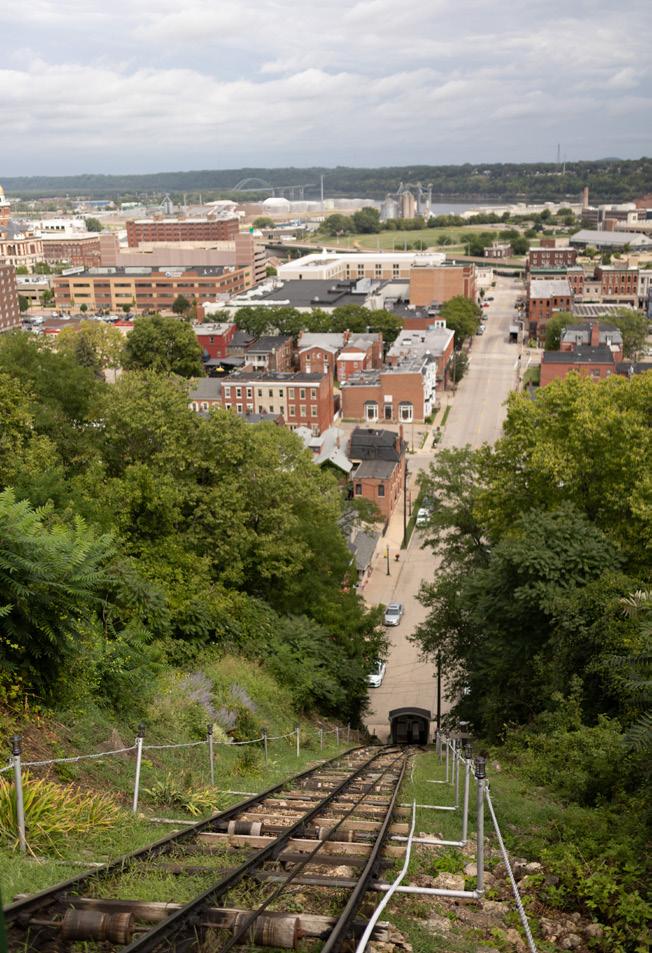
7 minute read
Dubuque: Where Iowa Started
Dubuque: Where Iowa Started
By Ann Thelen
Rich History, Stunning Views and Culinary Excellence Charm Visitors to the State’s Oldest City
Located along the mighty Mississippi River, Dubuque is known as the place “Where Iowa Started.” With its founding more than a decade before Iowa became a state, Dubuque and the county with its same name are rich in significance with more spots on the National Register of Historic Places than any other location in Iowa.
Abundant natural beauty is the canvas for this region, intertwining its agricultural heritage with tourism and hands-on exploration. It’s a place where vast limestone bluffs flank the world’s fourth longest river. It’s a destination carved out by the river’s influence, where stunning views, culinary excellence and revitalized regions charm visitors. It’s an outdoor lover’s paradise every month of the year.

Fenelon Place Elevator, the world’s shortest, steepest scenic railway.
Anchored by Agriculture and the Mississippi River
“What I appreciate most about the Dubuque area is the diversity of what people can see and do,” says Keith Rahe, president and CEO, Travel Dubuque. “The world-famous Mississippi River runs right outside our door, and throughout every season, the Upper Mississippi River Valley is absolutely gorgeous.”
The National Mississippi River Museum & Aquarium has become a major destination for people not only in the Midwest but also the entire nation and world. In the western part of the county, the Field of Dreams with its ball diamond carved out of a cornfield showcases Iowa’s roots in agriculture.
Dubuque leaders are proud of the role agriculture plays in both large and small communities in the region. Whether it’s a restaurant, brewpub, quilt shop or museum, they’re all woven together by agriculture. Farmers still bring grain into the elevators, and the storefronts lining Main Streets continue to flourish, thanks largely to agriculture and the role of the Mississippi River.
The Mississippi River is a working river, with approximately 60% of exported grain in the U.S. moving along the majestic waters. Although the Mississippi River has long been used for transportation, navigation has been forced to accommodate its whims – deep-flowing but turbulent in times of flooding; placid but shallow to the point of non-navigability in times of drought. Locks and dams help solve these challenges by creating a series of steps for river tows and other boats to climb or descend as they travel upstream or downstream.
The General Zebulon Pike Lock and Dam No. 11, located between Dubuque and rural Grant County, Wisconsin, keeps traffic flowing on the Upper Mississippi River. It was opened to navigation in 1937 and is listed on the National Register of Historic Places.
Connecting People Through Food and Experiences
Nestled within this region’s scenery, culture and artistry, Dubuque is home to awardwinning restaurants. With historic and newer establishments, entrepreneurs embrace the opportunity food provides as the ultimate connector.
Breitbach’s Country Dining
Opened in 1852 by a federal permit issued from U.S. President Millard Fillmore, Breitbach’s is Iowa’s oldest food and drinking establishment. Jacob Breitbach, great-great-grandfather of the present owner, purchased the business in 1862, and six generations of the Breitbach family have owned it since. Everything is made from scratch, earning the restaurant a prestigious James Beard America’s Classics Award. People travel from miles around for the fried chicken, pork tenderloin sandwiches and homemade pies, coupled with the amazing views across the river valley.
Convivium Urban Farmstead
In the North End Neighborhood of Dubuque, Convivium Urban Farmstead is thriving. In Latin, convivium means feast, a word that sparked the owners’ idea of creating a place for people to come together and celebrate around food.
After leaving successful corporate careers in insurance and marketing, Convivium co-founders Mike Muench and Leslie Shalabi bought a 1920s-era greenhouse complex in 2013. The husbandand-wife team have transformed the historic property into an urban educational farm, focusing on gardening education, cooking, food preservation, beekeeping and woodworking.

Leslie Shalabi owns Convivium with her husband.
“Convivium’s mission is to create a community around food,” Shalabi explains. “Every activity, event and interaction at Convivium is designed to foster connections that are pleasant, enjoyable and engaging.”
Neighbors donate backyard space for the couple to transform the land into food-producing gardens. The 13,000-squarefoot production gardens yield fresh produce for Convivium’s restaurant, while yellow-colored common beds throughout the neighborhood feature fresh vegetables for people to harvest and take for free.
From breakfast quiche, bowls and sandwiches to lunchtime burgers, paninis and pulled pork sandwiches, the restaurant helps adults and kids connect with the origins of food. During the COVID-19 shutdown, the restaurant created free casseroles for community residents in need.
“We started transforming our healthy greens and proteinbased ingredients into about 100 casseroles each week,” Shalabi says. “Thanks to grants and donations, we’ve continued the program and now give away 200 homemade casseroles every week. This type of food is needed, and the program will remain a part of our mission.”
Brazen Open Kitchen
In Dubuque’s up-and-coming Historic Millwork District, Brazen Open Kitchen is passionate about providing its patrons with a comfortable, stylish and exciting experience.

A meal being prepared at Brazen. (Photo Credit: Gigantic Design Co.)
Chef Kevin Scharpf prides himself on creating an authentic, progressive, yet approachable menu. One that highlights the seasonally fresh ingredients available in the Midwest with classic and modern techniques alike.
“We deeply care about offering complete hospitality from greeting our guests through the service, food, thank you and goodbye,” explains Scharpf, who competed on Season 16 of Bravo’s ‘Top Chef’ and was awarded the 2019 Iowa Restaurant Association’s Chef of the Year. “We follow a simple philosophy of loving what we’re doing and doing it the best we can. This approach goes into sourcing and preparation, and then, ultimately, into every service every night.”

(Photo Credit: Gigantic Design Co.)
Six years since creating Brazen, Scharpf has remained steadfast in his mission – to craft thoughtfully unique plates relevant anywhere in the culinary world and accessible to locals in Dubuque. He transforms ordinary items into extraordinary culinary art, striving to give food touches of surprise and excitement.
“We recently added covered cornbread to our menu. Instead of a traditional approach of serving it with butter, we deliver it smothered with creole crab gravy, pickled mustard seed, celery leaf and herb butter. It’s almost like a cornbread custard,” Scharpf explains. “We want the food to be done in a way that people think, ‘How in the world did they come up with this? It’s incredible.’”
Brazen’s success is a testament to how food can connect people to experiences and have a positive impact. “It’s such a gorgeous, foodrich area. We’re proud to be part of a movement that helps create food as a destination and harnessing an approach that keeps people coming back again and again,” he adds.
Destinations Along the Mississippi River
» Hotel Julien Dubuque began as the Waples House in 1839. This old “Julien Hotel” survived a fire, hosted famous guests, such as Abraham Lincoln, Buffalo Bill and Mark Twain, and gained notoriety thanks to gangster Al Capone. Now more than 180 years later, after a $33 million interior renovation and exterior restoration, Hotel Julien has redefined elegance by blending its rich history with modern luxury and style.
» St. Luke’s United Methodist Church is home to the fifth largest collection of Tiffany Windows in the U.S.
» The Fenelon Place Elevator is the world’s shortest, steepest scenic railway, 296 feet in length, elevating passengers 189 feet from Fourth Street to Fenelon Place. Visitors experience a magnificent view of the historic Dubuque business district, the Mississippi River and three states.
» With 1,437 acres of history and nature, the Mines of Spain is a family favorite. The Woodland Walk or Julien Dubuque Monument are quick visits, or the area offers many miles of hiking for a full day of explorations. The all-season Heritage Trail offers 26 miles of scenic adventure.
» The 164-acre Eagle Point Park overlooks the Mississippi River and is a perfect stop to see fall foliage. Eagle watchers often flock to Dubuque in the winter, and one of the best places to spot a bald eagle in the winter is near Lock and Dam No. 11.
» The American Lady Yacht features public cruises on the Mississippi River along the banks of Dubuque with lunch, happy hour and sunset dinner cruises.
» The Mississippi Riverwalk offers views with easy access. Located next to the Smithsonian-affiliated National Mississippi River Museum & Aquarium, this pathway winds along the river and faces the beautiful bluffs that surround it.
» The holiday season is a magical time in Dubuque, including seeing the twinkling lights of the Reflections in the Park drive-thru display.
» Dubuque’s terrain naturally lends itself to skiing and snowboarding as the winter months roll around. With 21 ski runs and two terrain parks, Sundown Mountain Resort is a great way to get outside and explore the natural beauty.










